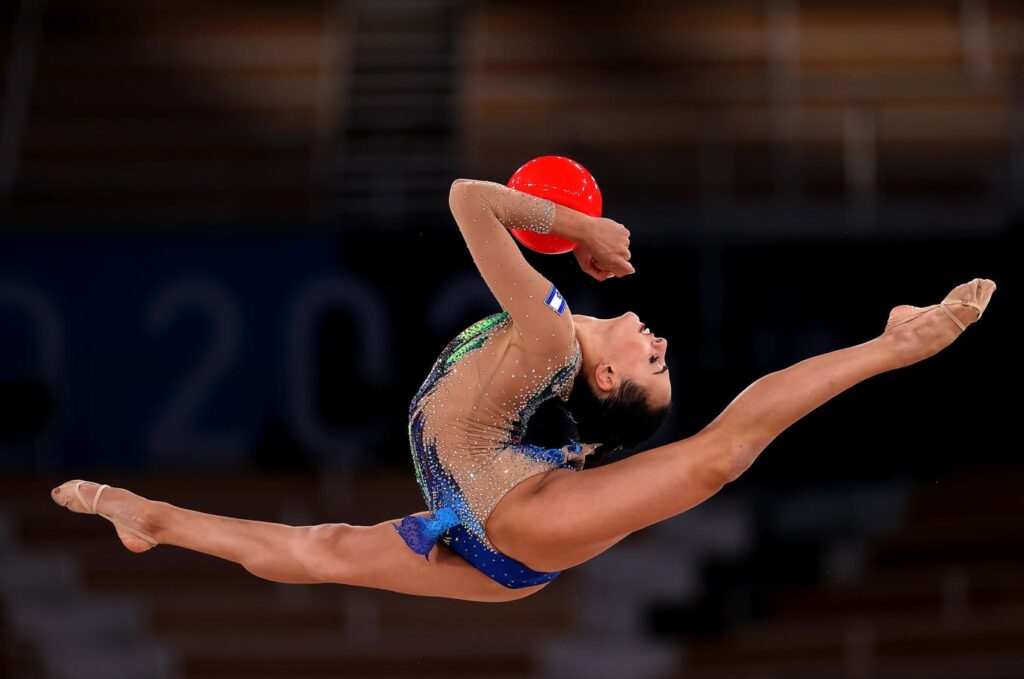If you thought all of Olympic gymnastics was over, think again because rhythmic gymnastics is just getting started with the first competition on Thursday. Read on for what to know about this sport, including podium predictions and the lone Team USA athlete to watch during the Paris Games.
What Is Olympic Rhythmic Gymnastics?
The sport of rhythmic gymnastics started in the former Soviet Union back in the 1940s, and they’ve been dominant ever since. The International Gymnastics Federation (FIG) finally recognized the sport in 1963, but it took another nearly 20 years for athletes to have the opportunity to debut on the Olympic stage.
What makes it special? Rhythmic gymnastics is different than artistic gymnastics because it’s a combination of performing gymnastics and dance while incorporating equipment — like a ball, ribbon, hoop, rope or clubs — throughout the routine.
Just like artistic gymnastics, rhythmic gymnasts compete in individual and team events, and rhythmic routines must be between 75-90 seconds long. For the individual performances, they compete four times with a different element used each time. And each of those scores are totaled for an all-around score. For the team competition, there are five gymnasts per team and each gymnast competes twice: once with one element and the second with a mixed selection.
Rhythmic gymnasts use music in their routines just like women’s artistic gymnasts use for their floor routines. But instead of the emphasis on tumbling and power, rhythmic routines are more about the artistry, flexibility and fluidness of the elements. They are judged similarly to artistic gymnasts with a score for how well they execute their skills (E score) and a score for the difficulty of their skills (D score). But there’s an additional score in rhythmic gymnastics for the artistry of the performance (A score). You’ll also only see women competing because rhythmic gymnastics is a female-only sport.
The first day of Olympic competition will be all-around qualifications. You’ll see 26 gymnasts performing, and the top ten will qualify to the all-around final to compete for the title. The next day will be qualifications for the team competition with 16 countries competing for one of eight spots in team finals with a chance of medaling.
What’s The History Of Rhythmic Gymnastics In The Olympics?
Rhythmic gymnastics was first introduced as an Olympic sport at the 1984 Los Angeles Games. At that time, there was only an individual all-around competition. But by 1996, the team competition was added for the Atlanta Games as gymnastics was starting to soar in popularity.
A Russian Dynasty
Prior to the 2020 Tokyo Games, Russia won gold in the individual all-around 16 years in a row. And since the 1996 Games when the team competition was introduced, Russia has medaled in every Olympics with five of those medals being gold. The only other countries to win team gold are Spain in 1996 and Belarus in 2020, and the United States has never won an Olympic medal in rhythmic gymnastics.
With Russia banned from participating in the Paris Games, this marks the first time in 28 years that the country won’t bring home a medal. In addition, reigning all-around Olympic champion Linoy Ashram of Israel and 2020 silver medalist Dina Averina of Russia have both retired, and bronze medalist Alina Harnasko of Belarus is out of contention with the country’s ban.
Who To Watch? Top Podium Predictions
- A favorite to win gold in the all-around is German gymnast Darja Varfolomeev. She’s the 2023 World all-around champion and the 2022 World silver medalist in the all-around.
- Italian gymnast Sofia Raffaeli is another favorite to medal after winning all-around in the 2022 Worlds and grabbing silver in 2023.
- Daria Atamanov of Israel is the third favorite after winning bronze in the 2023 World Championships and securing the 2022 European all-around champion title.
- The lone U.S. rhythmic competitor is Evita Griskenas, who qualified to the 2020 Tokyo Games and finished 12th in the all-around qualification. She’ll be trying to break into the top eight during Thursday’s qualifications for a shot at medaling.
How To Watch Olympic Rhythmic Gymnastics
Watch live on NBC/Peacock
Thursday, August 8:
- Individual Qualifications Part One at 4 a.m. ET
- Individual qualifications Part Two at 8 a.m. ET
Friday, August 9:
- Group Competition Qualification at 4 a.m. ET
- Individual All-Around Final at 8:30 a.m. ET
Saturday, August 10:
- Group Competition Final at 8 a.m. ET
Read the full article here














